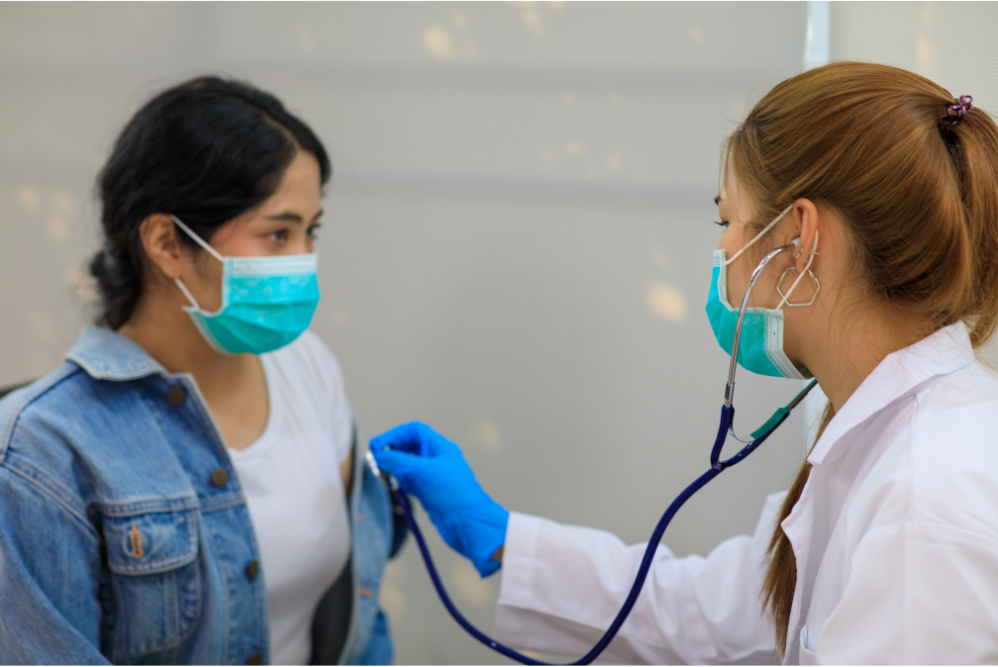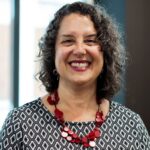We’ve come a long way baby. Back in May when the vaccination roll-out was just kicking off, Australia was at a very slow 2% double dose coverage among people aged 16 years and over. It is with some excitement that we say that Australia now boasts almost 80% of the 16+ population with one dose of vaccine, and 57.4% having had their double dose done and dusted.
With all this talk of double doses and opening up, surely it’s time to crack open the party poppers? It’s sad to say that we might need to keep the celebrations on ice for a while longer. While the pace of vaccination across the country gives us clear cause for celebration, there remains serious concern about areas and groups where the pace hasn’t been quite as cracking as the national average.
Migrant and refugee women, particularly those who live in disadvantaged areas, make up one of these groups of concern. Over-represented in essential services such as aged care, cleaning, retail and manufacturing, migrant and refugee women are at greater risk of COVID-19 infection. Sadly, people born overseas make up more than half of all cases in Victoria, and women are well represented in those numbers.
The Left Behind Report, launched today by the Multicultural Centre for Women’s Health and Gender Equity Victoria, shows that COVID-19 has significantly impacted on migrant and refugee women’s lives. In-language interviews with 75 Victorian migrant women, have shown that COVID-19 has decreased their economic and job security, their mental health and resilience, and their social and family ties. The report shows that there is still so much more we need to do equalise the COVID-19 vaccination response, with over 40% of respondents reporting that government messaging did not resonate with them, and almost 60% saying that they relied on family, friends and community to provide them with COVID-19 information in their languages.
There is significant variation in vaccination rates across our suburbs, with approximately 40% of LGAs across Australia with lower rates than the national average rate. The key determining factor that links these 200 LGAs is socio-economic disadvantage, as measured by the SEIFA, or the Socio-Economic Index for Areas. The LGAs of Hume, Brimbank and Greater Dandenong in Victoria have the lowest SEIFA ratings in the state. And while vaccination rates are climbing as we speak, they remain among the lowest in the country. It is not simply a matter of hesitation. These LGAs have lower numbers of GPs and other health services per capita, as well as a range of other barriers that can prevent access to vaccination at an early point.
The health system, including COVID vaccination, is weighted to provide earlier access to people who can navigate an electronic booking system with ease, who have access to up to date health information in their language, who speak English well, who have more flexibility in their work and home life, all factors that place you at the front of the pack in the vaccination race. The system also disadvantages migrant women who have temporary visas.
As one woman reported, “Since I don’t have Medicare it was really hard for me to book in [to health services], this barrier existed prior to COVID but was worse during the pandemic. Really struggled with access to mental health services during lockdowns, I had to wait months to see a psychologist.”
We’ve long known that disadvantage is bad for peoples’ health. In many cases it can be deadly. The Australian Institute of Health and Welfare has reported that in the first year of the pandemic, there were four times as many deaths from COVID-19 among people from socio-economically disadvantaged locations. Over 75% of the deaths were among people living in residential aged care, many of them women from migrant and refugee communities.
In addition to increased geographical and occupational exposure to COVID-19, migrant and refugee women are also less likely to have access to the information they need, in languages they prefer, to look after their health and wellbeing. Both federal and state governments have struggled to develop and distribute up to date, meaningful multilingual COVID-19 health and vaccine information, particularly timely, evidence-based information that responds to women’s concerns about the interactions of vaccines with fertility, pregnancy and breastfeeding.
A higher case load, less access to health information, essential service employment – add social isolation, the risk of family violence, mental health concerns, exclusion from government support, and you start to draw a sobering picture of the hidden side of COVID-19. As another woman told us about the compounding impacts of these experiences:
“Both my husband and I have low income. My working hours were cut. I got no JobKeeper payment because of my bridging visa status. I was stressed whenever any bill came to my home. I felt the Ministry of Home Affairs process my visa slowly. My children had to learn online and I could not help them with their study. They were depressed and did not listen to me.”
This is indeed a grim picture, but the upside is that we know how to fix the problem. As we move out of lockdown, we need to be sure that the most disadvantaged and exposed in our community are protected in equal numbers. In migrant and refugee communities, and socio-economically disadvantaged suburbs, we need more effort to create the change that is needed to bring everyone along. We need better booking systems, more pop-up clinics with health professionals who speak multiple languages.
We also need a significant, immediate boost to multilingual vaccination education, information and support that targets women in particular who are at the centre of family decisions to vaccinate, who will be responsible for the vaccination of children and are well positioned to share the information to others in their communities.
Programs like the WHOMEn project, that specifically target migrant women with tailored, meaningful information in their languages, make a huge difference to achieving equitable access, decreasing COVID-19 infection risk and increasing vaccination rates. Such programs tap into migrant and refugee women’s leadership and capacity to process and share the information that makes sense to them with others in their communities. They encourage conversation among women in their cultural context, engagement with hopes and fears, and provide an opportunity to access the evidence and consider the science.We’re all looking forward to the parties as we return to a COVID-safe way of living and working. But the whole community needs to be a part of the celebrations.
Please note: Feature image is a stock photo.
Dr Adele Murdolo is the Executive Director of the Multicultural Centre for Women’s Health, a national women’s health centre run by and for migrant and refugee women. Adele is a passionate speaker and advocate for building the status of migrant and refugee women through research, practice and policy.





